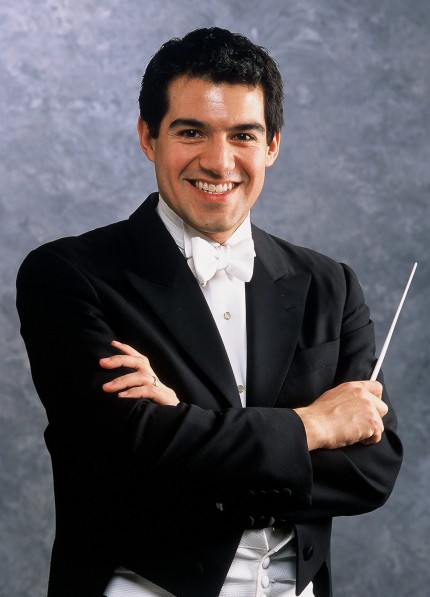Grant Park’s South American program bedeviled by post-Incan helicopter

Friday night’s Grant Park Orchestra concert perfectly showcased the pleasures and perils of outdoor concerts in downtown Chicago.
On stage at the Pritzker Pavilion, all was well. Guest conductor Miguel Harth-Bedoya presided over a nicely varied program of music and video projections featuring works by composers with South American roots titled “Caminos del Inka” (Trails of the Incas).
Designed by Harth-Bedoya, a native of Peru, to showcase South American classical music, the concert ranged from a courtly suite of dances by an 18th-century Peruvian bishop to widely contrasting pieces by two stars of today’s classical music scene: Osvaldo Golijov and Jimmy Lopez. A pair of Grant Park Orchestra’s stellar principal players—Mary Stolper, flute, and Walter Haman, cello—were the evening’s soloists.
Beyond the stage, however, problems arose–literally. Taste of Chicago is in full cry this weekend a few blocks south of Pritzker Pavilion, and Robert Plant’s thundering blues/rock concert wrapped up just as the Grant Park Orchestra concert began. Maybe the helicopter that roared and buzzed in endless circles near the pavilion was monitoring the departing Plant crowd. Whatever the reason, the lengthy, noisy flight was maddening, even for an audience well used to filtering out the sound of wailing sirens and hovering aircraft.
Ambient noise aside, the concert offered the kind of lively, thoughtful music-making that has become the Grant Park Music Festival’s signature. Conductor, soloists and orchestra seemed entirely unfazed by the clatter overhead, though the noise reached its peak in the two featured pieces: Gabriela Lena Frank’s Illapa, a tone poem for flute and orchestra, and Golijov’s elegiac Mariel with Haman as soloist.
Illapa is an ancient South American god of weather, and Stolper’s mercurial flute painted a brilliant portrait of an arrogant, maliciously gleeful deity. In a long, opening solo, her sound was breathy and insistent, demanding our attention in short, swirling outbursts. When the orchestra finally entered, their mood was tense and wary, conveying an image of human beings at the mercy of an all-powerful, trickster god.
Golijov wrote Mariel for cello and marimba in 1999 after the death of a dear friend and reworked it for cello and orchestra in 2007. Haman was an eloquent soloist, plumbing all the work’s dignity as well as its anguish. When the solemn melodies moved to high registers, Haman’s fragile but clear tone expressed a sense of vanished beauty and joy. In the cello’s dark, low phrases we felt the oppressive weight of profound grief.
The Grant Park Orchestra sounded responsive and relaxed throughout the evening. They found a sense of amiable nobility in the Coleccion de Musica Verreinal (Collection of Vice-Royal Music), a suite of dances from the 1700s by Baltasar Jamie Martinez Companon arranged by Harth-Bedoya. In Responsorio, a full-throated, mesmerizing 2000 work by Diego Luzuriaga, solo instruments jumped in and out of the spotlight. Driven by steady, powerful drums, their individual voices—from jaunty violin to bustling woodwinds—emerged and melted away in seamless succession. Lopez’s pop-inflused Fiesta! and Enrique Soro’s Danza Fantastica bristled with infectious, syncopated rhythms.
Videos, which looked terrific on the pavilion’s massive, crystal-clear screen, generally enhanced each piece. Colorful images of dancers and landscape were particularly effective in the opening work: El Condor Pasa (The Condor Passes) by Daniel Alomia Robles. (Simon and Garfunkel fans will recognize its gently swaying folk tune from their hit song of the same name.)
“Caminos del Inka” will be repeated at 8 tonight—without, one fervently hopes, helicopter obbligato. grantparkmusicfestival.com
Posted in Performances




